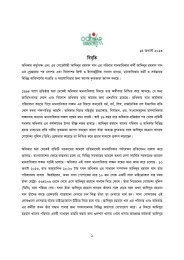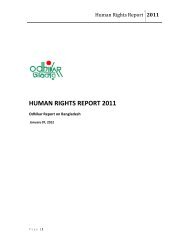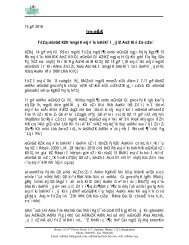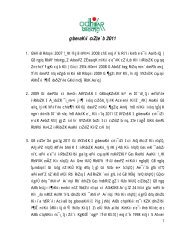Please - Odhikar
Please - Odhikar
Please - Odhikar
You also want an ePaper? Increase the reach of your titles
YUMPU automatically turns print PDFs into web optimized ePapers that Google loves.
law not only brings the evidence, it is the task of the law and state to make the law visible, to<br />
recreate the event, so that the trail may go on. When the trail goes on, law interprets law in the<br />
court and it becomes a further law. The justices present here are familiar with the term of<br />
precedence of law.<br />
The second issue is the trauma and stigma put on trafficked women and children and our own<br />
perceptions regarding trafficking. I witnessed one such People's Tribunal, where these women<br />
raised their voice. Their methodology was to make the silent voices heard in the society- without<br />
making the women victims embarrassed. We must integrate this aspect in the law to protect<br />
victims and witnesses. Coming to the third issue, caste cases are a difficult issue for the law. If<br />
caste is a law in a particular culture, how can a law be formulated against such existing law? We<br />
have to make justice available for everybody - irrespective of religion, nation and race.<br />
Justice Sharif Uddin Chaklader: As SAARC nations, we are facing the problem of trafficking.<br />
As the justice of the High Court, dealing with cases of trafficking, I face the difficult and almost<br />
impenetrable hurdle that we have evidence up to our border, and no evidence coming from<br />
across the border. In such a situation, we have no other option but to give the benefit of doubt to<br />
the offender. There is a special law called Women and Children Repression Prevention Act to<br />
combat trafficking. But we have no special court. So, I suggest that there should be a special<br />
court to deal with cases of trafficking. Recently I visited the lower court to find that women and<br />
children victims of trafficking have been jumbled up and kept with offenders of other crimes.<br />
The judges of the district level face difficulty in identifying laws provided for trafficking and<br />
also lack awareness and training in the issue of human rights and gender issues. Another point is<br />
that we are still following the British system of law in which compensation is a must. In these<br />
types of offences there should be no relaxing of justice and the deposition and statement of the<br />
victim must be taken to be the truth.<br />
The accused must be given the chance of self-defence. Everything lies on the victim to prove the<br />
accused guilty. When victim is controlled, there is no legal evidence to support him. Under the<br />
British system there is a Section in the Code of Criminal Procedure called section 161, which<br />
provides for the statement given by the victim when he or she is rescued. Unfortunately, such<br />
statements are not taken seriously immediately. My suggestion is when the victim is rescued; his<br />
or her statement must be taken immediately. If the statement is taken immediately, it is almost<br />
always probable that in these cases she is telling the truth. If the statement is taken later, after a<br />
span of time she may not speak the truth for different reasons - fear, intimidation, threats, etc.<br />
So, this system of not taking the first statement into consideration must be abolished. When a<br />
case is filed by FIR or by complaint, there is an investigation according to procedure. In many<br />
cases the report of the investigative officers are considered as the final report in the absence of<br />
any naraji petition or objection by the court. Before accepting the final report, the investigative<br />
officer must be examined by the court in order to prove his report. In our society the<br />
investigative officer is not free of influence by the powerful people. Mr. Tariq ul Hakim and I<br />
were in Nepal, where we witnessed a declaration that there should be a SAARC court for<br />
trafficking, since it starts in one country and involves other countries afterwards. My law may<br />
not be acceptable to the Indian law. Indian law may not be acceptable by the Nepalese. So, there<br />
must be a common law to combat trafficking because this is a regional problem. Without a<br />
single law the influences by the people concerned cannot be ruled out.<br />
70<br />
Report 2005











